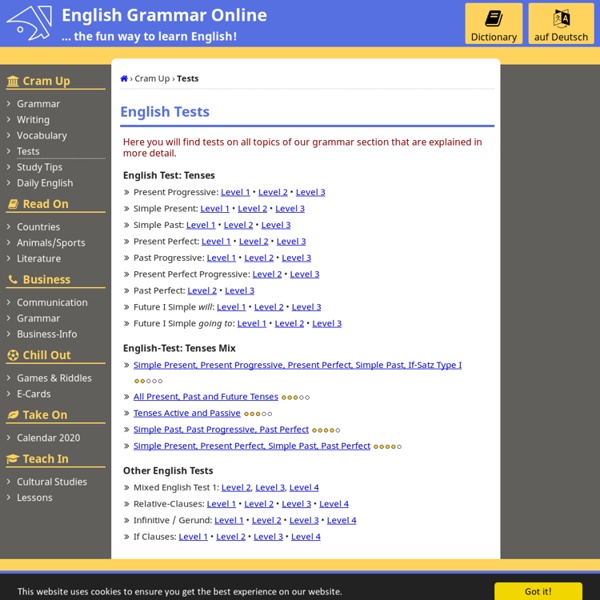Game using present continuous
ESL Interactive Fun Games Here we have the games carefully laid out for you. Follow the links to browse the variety of games offered. Grammar Games & Interactive Exercises - Click Here! Games for Practising Grammar: Present simple/present progressive games, past tense games, present perfect games, comparative/Superlatives and more... Vocabulary Games & Interactive Exercises - Click Here! Games for practising English vocabulary: Lots of games by topics and game types Pronunciation Games & Interactive Exercises - Click Here! Games to practice English pronunciation, phonetics and phonics. Reading/Spelling Games & Interactive Exercises - Click Here! Games and exercises to practice reading, spelling and lexis
Quizzes
Quizzes Main-Celebs-Movies-TV-Music-Life-More [First] « Prev 1 2 3 4 5 6 7 8 9 Next » [Last] more quizzes »
English Grammar Online - free exercises, explanations, vocabulary, dictionary and teaching materials
Verb Tense Tutorial
Verb tenses are verb forms (went, go, will go) which English speakers use to talk about the past, present, and future in their language. There are twelve verb tense forms in English as well as other time expressions such as used to. For English learners, knowing how to use English tenses can be quite a challenge. Never fear. Englishpage.com's verb tense tutorial will teach you to think like a native speaker. How to use this tutorial: 1. 2. 3. Verb Tense Exercises About the Verb Tense Chart Look at the verb tense chart above. There are also three simple tenses, three continuous tenses, three perfect tenses and three perfect continuous tenses. For example, all simple tenses have similar uses. Did you also notice that present tenses and past tenses only have one form whereas future tenses have two forms? Common Questions about Verb Tenses How can I learn verb tenses? Our native language changes the way we think about time. For this reason, you have to learn to think like an English speaker.
Reading
Reading Lessons International Women's Day - A reading comprehension test on the topic of International Women's Day Night Study in Korea - A reading comprehension test on the topic of night studying in Korea. History of Halloween - A reading comprehension test on the topic of Halloween. Catching a Cold - A reading comprehension test on the topic of catching a cold Levi's Blue Jeans - A reading comprehension test on the topic of Levi's Blue Jeans Take a Bath!
Infinitive and Gerund
Exercises and Tests on Infinitive and Gerund There are certain words in English that are usually followed by an infinitive or gerund. If you are not sure whether to use the infinitive or gerund, check out our lists or look the words up in a dictionary. Infinitive Use Certain words are followed by an infinite verb with or without ‘to’. Gerund Form ing form of the verb Exceptions in Spelling See → Present Progressive – Exceptions Certain words are followed by an Ing-Form. Words followed either by Infinitive or Ing-Form Exercises and Tests Infinitive Gerund Infinitive / Gerund Tests on Infinitive and Gerund Level 1 • Level 2 • Level 3 • Level 4
What is Verb to be? - Ser o Estar
El verbo TO BE, que en castellano se traduce como SER o ESTAR, en el idioma inglés goza de una particular importancia. Su significado depende del sentido de la oración. Por ejemplo: I am a doctor. En el siguiente cuadro se puede observar su declinación en el modo indicativo del Presente Simple: Tanto en el modo afirmativo como en la forma negativa pueden utilizarse las siguientes contracciones: Ahora veremos la conjugación del verbo TO BE en el Pasado Simple, tiempo verbal que corresponde al equivalente en castellano del Pretérito Imperfecto y Pretérito Indefinido: Aquí también se pueden utilizar las formas contraídas únicamente en la forma negativa: Un detalle a tener en cuenta, es que las contracciones generalmente se usan durante una conversación y no así en la escritura, salvo que se trate de un texto informal o que transcriba un diálogo. Cabe destacar que el verbo TO BE también se utiliza en algunos casos especiales que difieren de idioma español, como por ejemplo: John is 15 years old.
Best Creative Writing Exercises (PHOTOS)
Writers block, oh, writers block ...please go away! Even though it's the bane of all writers' existence, there are a bevy of ways to bypass the darn thing. From writing prompts to writing exercises, there are thousands of ways to get the creative juices flowing. Here are just a few of our favorites. Trust us, they work! Try them out and report back. Loading Slideshow 7x7x7x7Grab the 7th book from your bookshelf. Best Creative Writing Exercises 1 of 10 Hide Thumbnails
Simple Present vs Present Continuous
I- Complete Jane's daily routine by choosing the correct form of the verb in brackets. Jane Smith (be) a good secretary. She (go) to the office every day in the morning and she (stay) there till twelve o'clock. In the afternoon she (not go) to work. She usually (walk)in the park with her children. After dinner her husband (wash) the dishes and she (help) the children with their homework. They (not go) late to bed because they always (get up) very early. II- Number the pictures according to the sentences. 1- Tom is fishing with his son. 2- The girls are learning to cook. 3- He is swimming in the pool. 4- Jim is painting the ceiling. 5- She is running. 6- The children are listening to music. 7- My little brother is surfing the Internet. 8- She is reading a book. III-Complete the sentences with the Simple Present or the Present Continuous. 1.He usually (go) to work by bus but today he (go) by train. 2.Jane always (sleep) after lunch but this afternoon she (visit) her best friend. 5.



